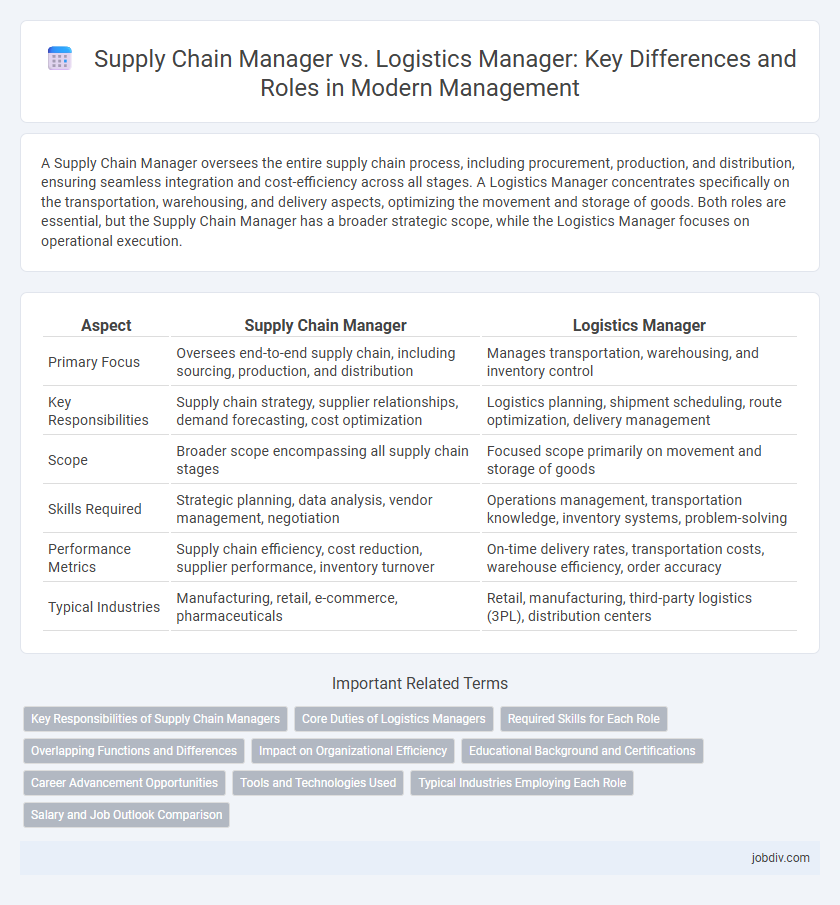A Supply Chain Manager oversees the entire supply chain process, including procurement, production, and distribution, ensuring seamless integration and cost-efficiency across all stages. A Logistics Manager concentrates specifically on the transportation, warehousing, and delivery aspects, optimizing the movement and storage of goods. Both roles are essential, but the Supply Chain Manager has a broader strategic scope, while the Logistics Manager focuses on operational execution.
Table of Comparison
| Aspect | Supply Chain Manager | Logistics Manager |
|---|---|---|
| Primary Focus | Oversees end-to-end supply chain, including sourcing, production, and distribution | Manages transportation, warehousing, and inventory control |
| Key Responsibilities | Supply chain strategy, supplier relationships, demand forecasting, cost optimization | Logistics planning, shipment scheduling, route optimization, delivery management |
| Scope | Broader scope encompassing all supply chain stages | Focused scope primarily on movement and storage of goods |
| Skills Required | Strategic planning, data analysis, vendor management, negotiation | Operations management, transportation knowledge, inventory systems, problem-solving |
| Performance Metrics | Supply chain efficiency, cost reduction, supplier performance, inventory turnover | On-time delivery rates, transportation costs, warehouse efficiency, order accuracy |
| Typical Industries | Manufacturing, retail, e-commerce, pharmaceuticals | Retail, manufacturing, third-party logistics (3PL), distribution centers |
Key Responsibilities of Supply Chain Managers
Supply Chain Managers oversee the entire supply chain process, including procurement, production, inventory management, and distribution to ensure optimal efficiency and cost-effectiveness. They coordinate with suppliers, manufacturers, and retailers to align supply chain strategies with business goals and customer demand. Their responsibilities also involve analyzing supply chain performance metrics and implementing improvements to enhance service levels and reduce operational risks.
Core Duties of Logistics Managers
Logistics Managers oversee the planning, implementation, and coordination of the movement and storage of goods, ensuring timely delivery and inventory optimization. They manage transportation modes, warehouse operations, and distribution networks to minimize costs while maintaining service quality. Core duties include route optimization, shipment tracking, and collaboration with carriers and vendors to streamline supply chain efficiency.
Required Skills for Each Role
Supply Chain Managers require strong analytical skills, strategic thinking, and proficiency in demand forecasting and inventory management to optimize end-to-end supply chain efficiency. Logistics Managers need expertise in transportation planning, warehouse operations, and route optimization to ensure timely and cost-effective delivery of goods. Both roles demand excellent communication and leadership abilities, but Supply Chain Managers focus more on planning and coordination, while Logistics Managers emphasize execution and operational control.
Overlapping Functions and Differences
Supply Chain Managers oversee end-to-end processes including procurement, production, and distribution, while Logistics Managers focus specifically on transportation, warehousing, and inventory control. Both roles collaborate to optimize the movement of goods, but Supply Chain Managers have a broader strategic scope managing supplier relationships and demand forecasting. Logistics Managers implement tactical operations ensuring timely delivery and cost efficiency within the supply chain framework.
Impact on Organizational Efficiency
Supply Chain Managers optimize end-to-end processes, integrating procurement, production, and distribution to enhance organizational efficiency by reducing costs and improving product flow. Logistics Managers focus on transportation, warehousing, and inventory management, ensuring timely delivery and operational effectiveness within the supply chain. The collaboration between both roles streamlines operations, minimizes delays, and boosts overall productivity across the organization.
Educational Background and Certifications
Supply Chain Managers often hold degrees in supply chain management, business administration, or industrial engineering, emphasizing strategic planning and process optimization. Logistics Managers typically possess educational backgrounds in logistics, transportation, or operations management, focusing on the coordination of goods movement. Certifications such as APICS Certified Supply Chain Professional (CSCP) for Supply Chain Managers and Certified Logistics Professional (CLP) for Logistics Managers enhance expertise and career prospects in their respective fields.
Career Advancement Opportunities
Supply Chain Managers typically have broader career advancement opportunities compared to Logistics Managers due to their strategic role in overseeing end-to-end supply chain processes, including procurement, production, and distribution. Logistics Managers generally focus on the efficient transportation and warehousing of goods, which may limit their progression to higher executive roles without expanding their skill set into broader supply chain functions. Advancement for Supply Chain Managers often leads to positions such as Director of Supply Chain, VP of Operations, or Chief Supply Chain Officer.
Tools and Technologies Used
Supply Chain Managers utilize advanced software platforms like ERP (Enterprise Resource Planning) systems, demand forecasting tools, and supply chain analytics to optimize end-to-end operations and strategic planning. Logistics Managers primarily depend on transportation management systems (TMS), warehouse management systems (WMS), and real-time tracking technologies to ensure efficient movement and storage of goods. Both roles integrate IoT devices and AI-driven automation to enhance supply chain visibility and operational efficiency.
Typical Industries Employing Each Role
Supply Chain Managers are commonly employed in industries such as manufacturing, retail, and healthcare, where overseeing the entire supply chain from procurement to distribution is critical. Logistics Managers are frequently found in transportation, warehousing, and e-commerce sectors, focusing on the efficient movement and storage of goods. Both roles are essential in industries like automotive and consumer goods, but the Supply Chain Manager's scope is broader, encompassing strategic planning across multiple functions.
Salary and Job Outlook Comparison
Supply Chain Managers typically earn a higher median salary, averaging around $95,000 annually, compared to Logistics Managers who make approximately $75,000 per year. The job outlook for Supply Chain Managers is projected to grow 11% through 2031, outpacing the 6% growth rate forecasted for Logistics Managers. Increased globalization and e-commerce expansion drive stronger demand for Supply Chain Management professionals specializing in end-to-end operations.
Supply Chain Manager vs Logistics Manager Infographic

 jobdiv.com
jobdiv.com